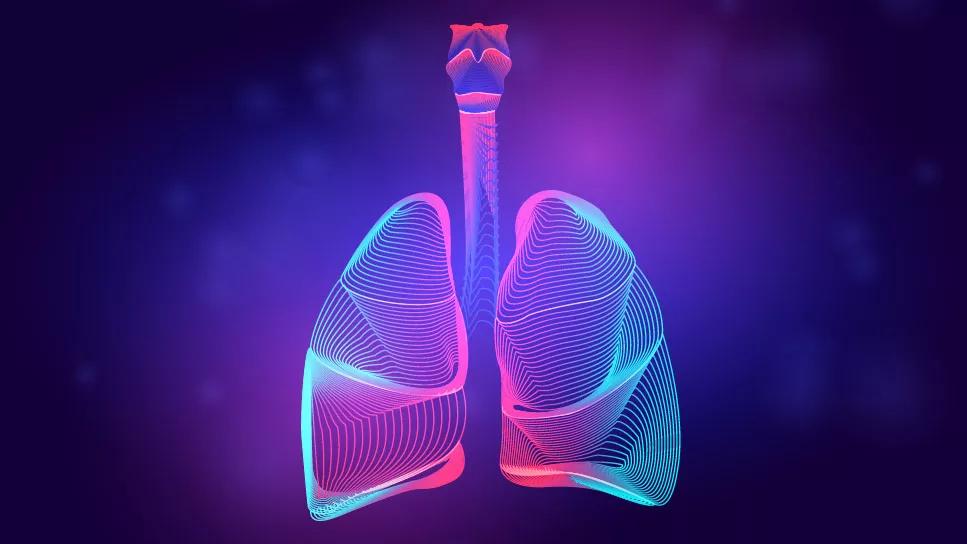New risk-modeling approach to use microsimulations, incorporating day-to-day changes in patients

Image content: This image is available to view online.
View image online (https://assets.clevelandclinic.org/transform/5e5516c3-9ea6-44cd-85c9-22b8908a162d/23-PUL-4454108-CQD-Exhaled-Breath-Analysis_jpg)
LUNG TRANSPLANT rev 2
Director of Lung Transplant Outcomes Maryam Valapour, MD, MPP, and a multidisciplinary team of researchers have received a four-year, $3 million R01 grant from the National Institutes of Health (NIH) to develop an improved risk-modeling approach to help prioritize patients with advanced lung diseases for lung transplant.
Advertisement
Cleveland Clinic is a non-profit academic medical center. Advertising on our site helps support our mission. We do not endorse non-Cleveland Clinic products or services. Policy
Currently patients with advanced lung disease are prioritized for lung transplant through the Lung Allocation Score (LAS) system. The LAS estimates the benefit a patient may derive from a transplant by calculating predicted waitlist mortality and posttransplant survival. A patient with a higher LAS is given a higher priority for transplant.
The LAS, implemented in 2005, was a vast improvement of the prior system, which allocated donor lungs based on the amount of time accrued by a patient on the waiting list rather than his or her risk of impending mortality while waiting. Over time, small changes were implemented to improve the accuracy of the LAS, but it was clear to this team of investigators that there was room for more comprehensive and systemic improvement.
Dr. Valapour and her colleague Jarrod Dalton, PhD, a data scientist at Cleveland Clinic’s Lerner Research Institute, noted a major concern with the LAS system. It assumes that the relationship between clinical risk factors and mortality risk is fixed across all transplant candidates with end-stage lung disease. However, clinical observation shows that this is not the case.
With the award from the NIH, the team will work to develop a more dynamic system using microsimulations, a method that was not available when the LAS was first developed.
This new system will incorporate day-to-day changes in candidates’ pulmonary, cardiac and renal clinical measures, among others, and determine how their interactions impact a patient’s risk of mortality prior to and after transplant.
Advertisement
This group of researchers will work to simulate different donor lung allocation strategies to better understand how patient- and population-level outcomes will be impacted in this new system. The team includes a transplant epidemiologist, statisticians, health economists and public policy experts and will involve collaboration with the U.S. Scientific Registry of Transplant Recipients (SRTR), the scientific arm of the U.S. transplant system funded by the Health Resources and Services Administration. Dr. Valapour serves as Senior Lung Transplant Investigator of SRTR and as a scientific advisor to U.S. lung transplant policymakers.
“Our goal is to work across disciplines to bring the best and brightest minds to advance lung transplantation,” says Dr. Valapour. “We are hopeful that this research will improve the survival of patients as they await transplant and beyond.”
With an average posttransplant life expectancy of 6.7 years, lung transplant patients experience a shorter survival than patients with other solid organ transplants. More accurately identifying those who may have the highest transplant benefit will provide for rational changes to the current system to potentially maximize survival on the population level.
Improving the U.S. lung transplant allocation system is a major focus of research for this group, which has contributed to a number of recent changes. Two members of the team hold career development awards in this area. Wayne Tsuang, MD, MHS, holds an NIH K23 Career Development Award, studying the impact of broader geographic sharing of donor lungs on patient outcomes. Carli Lehr, MD, holds the Cystic Fibrosis Harry Shwachman Clinical Investigator Award, studying methods to improve timely transplant access for cystic fibrosis patients.
Advertisement
Advertisement
Takeaways from the most recent annual meeting centered around clinical advances, AI integration and professional development
Recent breakthroughs have brought attention to a previously overlooked condition
A review of treatment options for patients who may not qualify for surgery
Looking at the real-world impact and the future pipeline of targeted therapies
The progressive training program aims to help clinicians improve patient care
New breakthroughs are shaping the future of COPD management and offering hope for challenging cases
Exploring the impact of chronic cough from daily life to innovative medical solutions
How Cleveland Clinic transformed a single ultrasound machine into a cutting-edge, hospital-wide POCUS program